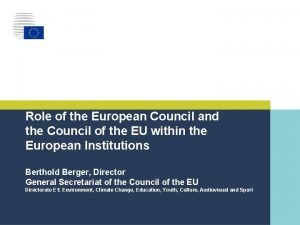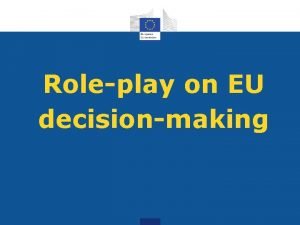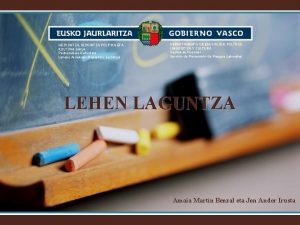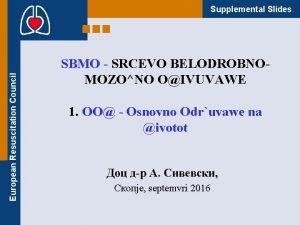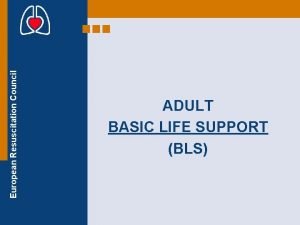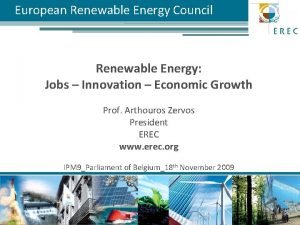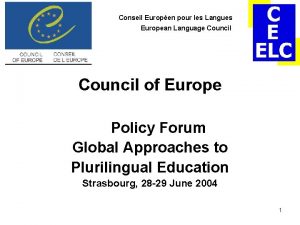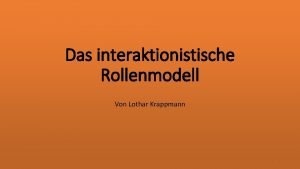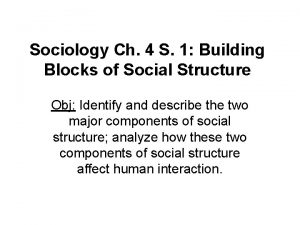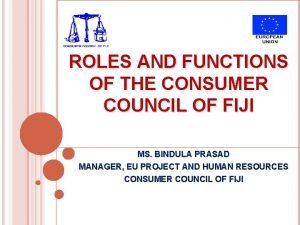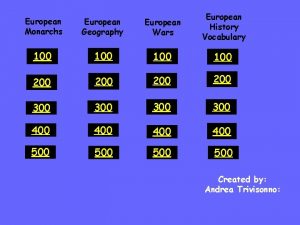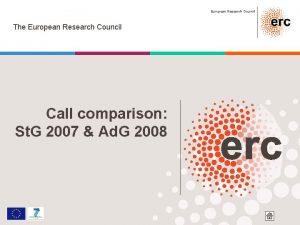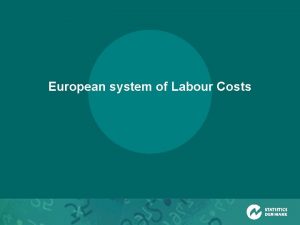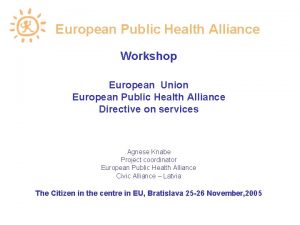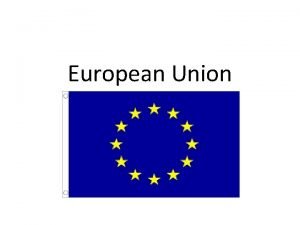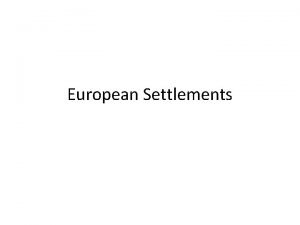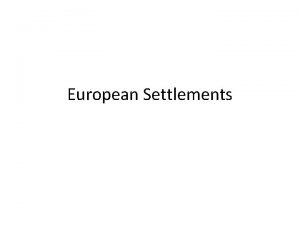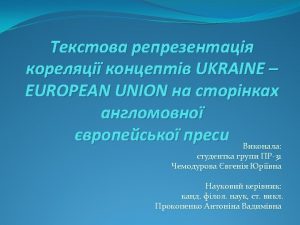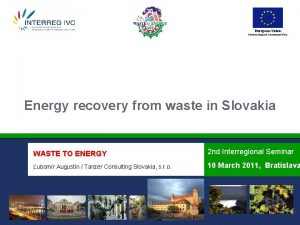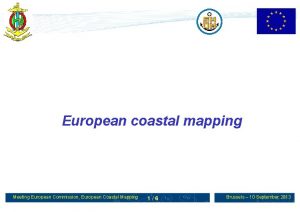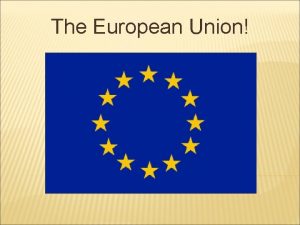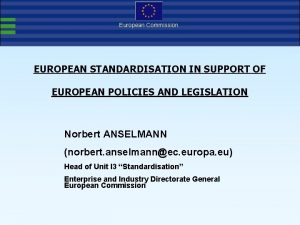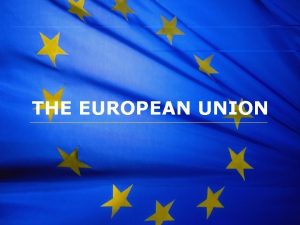Role of the European Council and the Council
















- Slides: 16

Role of the European Council and the Council of the EU within the European Institutions Berthold Berger, Director General Secretariat of the Council of the EU Directorate E 1: Environment, Climate Change, Education, Youth, Culture, Audiovisual and Sport | 1|

The European Union | 2| 3 July 2017, Alpeuregio Summer School 2

The Union’s Institutions • The European Parliament • The European Council • The European Commission • The Court of Justice of the European Union • The European Central Bank • The Court of Auditors | 3| 3 July 2017, Alpeuregio Summer School 3

Other EU bodies • The Euro Group – Meeting of the 19 Finance Ministers of the Eurozone – Chaired by a Permanent President – President Jeroen Dijsselbloem, as from Jan. 2013 • The Eurozone Summit – Chaired by the President of the European Council • The High Representative – Chairs the Foreign Affairs Council – Head of the European External Action Service – Vice President of the European Commission | 4| 3 July 2017, Alpeuregio Summer School 4

The European Council | 5| 3 July 2017, Alpeuregio Summer School 5

The European Council • Identifies strategic interests and objectives of the Union • Defines general political direction by consensus • Acts also by a Qualified Majority i. e. in: § Electing its President § Appointing the High Representative § Establishing the list of Council configurations • Exercises no legislative functions • Meets at least 4 times a year in Brussels and whenever necessary | 6| 3 July 2017, Alpeuregio Summer School 6

Donald TUSK, President of the European Council • Elected for 5 years (in office since December 2014), re-elected at the March 2017 European Council • Chairs the European Council’s meetings and Eurozone summits • Facilitates cohesion and consensus within the European Council • Reports to the EP after each meeting • Informs the non-Eurozone Member States after Eurozone summits | 7| 3 July 2017, Alpeuregio Summer School • Ensures external representation of the Union at his level for CSFP issues 7

The Council of the EU | 8| 3 July 2017, Alpeuregio Summer School 8

The Council of the EU • Exercises legislative and budgetary functions, jointly with the European Parliament and on the basis of a proposal from the Commission • May also exercise executive functions for implementing acts • Acts by a Qualified Majority unless provided otherwise by the Treaty of the EU • Meets in 10 different configurations: the General Affairs Council ensures the consistency of their work • Foreign Affairs Council: – Elaborates Union’s external action based on orientations given by the European Council – Ensures the consistency of the Union’s external action | 9| 3 July 2017, Alpeuregio Summer School 9

Structure of the Council • Ministers Council (10 formations) • Permanent Representatives Coreper 1 Coreper 2 • Working Parties / Committees | 10| 3 July 2017, Alpeuregio Summer School 10

Ten Council formations General Affairs (GSC support from DQPG – DG G regional) 2 Foreign Affairs (support from DG C and EEAS) 2 Economic and Financial Affairs (support from DG G) Justice and Home Affairs (support from DG D) 2 2 Competitiveness (Internal Market, Industry, Research 1 and Space, support from DG G) Employment, Social Policy, Health and Consumer Affairs 1 (support from DG B) | 11| Agriculture and Fisheries (support from DG B) 1 Environment (support from DG E) 1 Education, Youth, Culture and Sport (support from DG E) 1 Transport, Telecommunications and Energy (support from DG E) 1 26/09/2020 11

Rotating Presidency of the Council • Each Member State in turn every 6 months • 18 -Months rolling programme of three successive presidencies (current trio: Estonia, Bulgaria, Austria) • Chairs: – Council formations except Foreign Affairs, – COREPER I and II – Committees and working groups except those related to CFSP and CSDP | 12| 3 July 2017, Alpeuregio Summer School 12

Figures for Previous Qualified Majority Voting (QMV) System Germany, France, Italy, United Kingdom Spain, Poland Romania Netherlands Belgium, Czech Republic, Greece, Hungary, Portugal Bulgaria, Austria, Sweden Denmark, Croatia, Ireland, Lithuania, Slovakia, Finland • Cyprus, Estonia, Latvia, Luxembourg, Slovenia • Malta 29 27 14 13 12 10 • • 7 4 3 TOTAL 352 • QMV until November 2014 = 260 votes (and at least 62% of total population) • As from November 2014 -> 55% Member States and 65 % total population | 13| 3 July 2017, Alpeuregio Summer School 13

Qualified Majority Voting (QMV) • Current system results from Lisbon Treaty • On 1 November 2014, a system of double majority of members and of population replaced the rules based on a system of weighted votes attributed to each Member State, since 1957. • The new QMV is requiring 55% of the Member States (16 MS) representing at least 65% of total population (in 2014 around 328. 6 million). • A blocking minority will have to include at least four members • Transitional provisions has allowed any Member State to request, until 31 March 2017, that the rules on majority voting in force before 1 November 2014 apply to a specific act. | 14| 3 July 2017, Alpeuregio Summer School 14

Voting by Unanimity Still required inter alia in the following areas: • Enlargement of the EU • Taxation • Multiannual Financial Framework • Harmonisation in the field of social security and social protection • Family law, passports and identity cards, operational police cooperation • Common Foreign and Security Policy • Common Security and Defence Policy | 15| 3 July 2017, Alpeuregio Summer School 15

General Secretariat of the Council • Assists the members of the European Council and its President • Supports the members of the Council of the EU (including ‘Foreign Affairs’) and its Presidency • Gives policy, procedural advice and logistical support • Drafts records of proceedings and supports the Presidency in updating working documents • Ensures continuity beyond the 6 -month term • Provides legal advice to the Presidency and Member States • Issues communications and press releases • Is responsible for publication of legislative acts in the Official Journal • Provides institutional memory | 16| 3 July 2017, Alpeuregio Summer School 16
 European council role
European council role Azure worker role
Azure worker role European role play
European role play Coordinating european council
Coordinating european council European resuscitation council
European resuscitation council European resuscitation council
European resuscitation council Bls
Bls European cruise council
European cruise council European renewable energy council
European renewable energy council European language council
European language council Krappmann role taking
Krappmann role taking Statuses and their related roles determine the structure
Statuses and their related roles determine the structure Identify the role of the consumer council of fiji
Identify the role of the consumer council of fiji Hát kết hợp bộ gõ cơ thể
Hát kết hợp bộ gõ cơ thể Bổ thể
Bổ thể Tỉ lệ cơ thể trẻ em
Tỉ lệ cơ thể trẻ em
